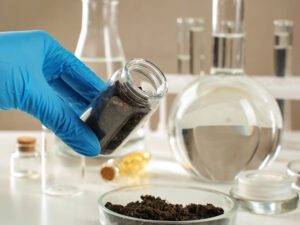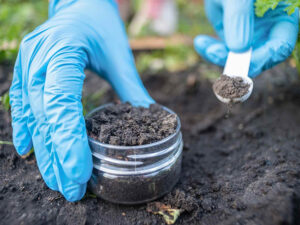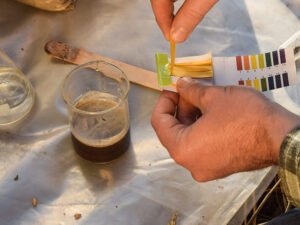Soil Testing: Why, How, and Where to Get Tested
by Brett Kerley

soil testing in a laboratory
Soil testing is an essential step for anyone looking to optimize their soil conditions for gardening, or landscaping. It helps determine the soil’s nutrient levels, pH, drainage, and overall health, which are crucial factors in ensuring successful plant growth and land use. In Edmonton, soil testing can provide valuable information for a variety of purposes, including agriculture, home gardening, and land development.
Why Test Your Soil?
Soil testing is important for several reasons:
- Nutrient Levels: Determine whether your soil is lacking essential nutrients like nitrogen, phosphorus, and potassium, or whether it has too much of certain minerals, which can harm plant growth.
- pH Levels: Soil pH affects nutrient availability and microorganism activity. A pH that is too high (alkaline) or too low (acidic) can hinder plant health.
- Soil Texture & Structure: Testing can help determine the soil’s texture (clay, loam, sand) and how well it retains water or drains. This is crucial for understanding irrigation needs and the suitability of the soil for different plants.
- Contaminant Detection: If you’re planning to build on land or grow food, soil testing can identify contaminants like heavy metals, pesticides, or other harmful substances.
- Environmental Concerns: It helps identify potential environmental issues like soil erosion, compacting, or salinization, which may affect land use.
How to Test Your Soil
Soil testing can be done through DIY kits or by sending samples to a professional lab. Here’s how you can go about it:

Collecting soil for testing
Collect Samples:
- Select Multiple Locations: For more accurate results, collect soil samples from different areas of your yard, or garden. Ideally, take 4-6 samples from different spots, especially if you have a large area.
- Sampling Depth: For garden soil, dig down about 3-4 inches. For lawn soil, sample at a shallower depth (2-3 inches).
- Clean Tools: Use clean, non-corrosive tools (like a spade or trowel) to collect the sample. Avoid using tools that have previously been in contact with chemicals or fertilizers.
- Avoid Contamination: Ensure the samples don’t contain organic matter like grass, leaves, or sticks.
Send Samples to a Lab:

Using test strips to check soil pH
- Prepare Samples: Mix all collected samples thoroughly, and place 1-2 cups of the mixed soil in a clean, plastic bag or container.
- Complete Forms: Some labs require forms detailing your concerns or the specific tests you want. If you’re uncertain about what you need, general soil analysis will typically cover basic pH, nutrient levels, and texture
- A professional lab will typically test for:
- pH level
- Macronutrient content (nitrogen, phosphorus, potassium)
- Micronutrient levels (iron, zinc, copper, etc.)
- Organic matter content
- Soil texture (sand, silt, clay ratio)
- Contaminants (if requested)
DIY Kits

rapitest home soil test kit
Soil testing kits are available at most home improvement or garden centres, and these can provide instant results for pH and basic nutrient levels. However, they may not provide as comprehensive data as professional lab tests.
Where to Get Soil Tested in Edmonton
In Edmonton, there are several options for soil testing, ranging from local agricultural services to commercial laboratories. Here are just a few:
CARO Analytical Service – Soil Testing
- Services Location: 17225 109 Ave NW Edmonton, AB
- Contact: CARO
- Services: CARO’s soil testing capabilities are classified into 5 categories: Physical Tests, Fertility & Microbiology, Metals & Inorganics, Organics, and Leachate Procedures
SGS Crop Science – Canada
- Location: Sherwood Park Laboratory – Unit 310, 280 Portage Close, Sherwood Park, AB, T8H 2R6
- Contact: SGS
- Services: Laboratory analysis plays a key role in managing nutrients for field crops and identifying amendments for remediation. SGS can assist growers and restoration companies by providing the nutrient, physical, and chemistry specifications necessary for management decisions.
Natural Resources Analytical Laboratory (NRAL) (UofA)
- Location: Natural Resources Analytical Lab, Department of Renewable Resources, 4-52 of the South Academic Building (SAB) Edmonton, AB
- Contact: NRAL
- Services:Service research laboratory operated on a cost recovery basis by the Faculty of Agricultural, Life & Environmental Sciences. NRAL’s services include elemental analyses of soil, plant, biological material, greenhouse gas and water samples and are available to University of Alberta researchers, researchers from other Universities, government organizations, and industry.
The Cost of Soil Testing
The cost of soil testing varies depending on the type and depth of testing required. Here are general price ranges:
- Basic Soil Test: $20–$50 CAD for basic pH and nutrient testing.
- Comprehensive Soil Test: $50–$150+ CAD for detailed testing, including heavy metals and contamination tests.
- Agricultural Testing: For farm-scale analysis or detailed environmental concerns, costs may range from $100–$500+ CAD.
Interpreting Results
Once you receive your soil test results, the laboratory will usually provide recommendations for improving your soil, such as adding lime to adjust pH, or adding specific fertilizers to correct nutrient imbalances. Many labs also offer consultation services to help you understand how to best amend your soil for the plants you want to grow.
Final Thoughts
Soil testing can greatly improve your gardening, landscaping, or agricultural outcomes. Whether you’re testing for basic soil health or more specialized concerns like contamination, local labs and services provide a range of options. Make sure to collect samples properly, choose the right testing service for your needs, and use the results to improve your soil’s fertility and overall health.
Now that you’ve unearthed the secrets of your soil, go forth and garden like a pro. May your compost be rich, your tomatoes plump, and your pH just right. Dig you later, dirt detectives!
















